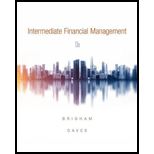
Concept explainers
a)
To discuss: Meaning of business risk, capital structure and financial risk.
a)
Explanation of Solution
Capital structure is the combination of debt and equity. Through capital structure it is decided that how much leverage ratio has to be maintained and company decides which sources it will get money and how much volume.
Business risk refers possibility of occurrence of loss due to changes in government policy, taste and preferences of customers that will leads to affect the factors like sales volume, sale price and sales per unit.
Financial risk is the risk where various types of risks associated with this like default risk, in which company sold out item in credit to customer, if customer default in payment or increased the time limit of payment of his cash which ultimately increase the financial risk.
Financial risk might arise due to foreign investment wherever the possibility of risk is higher.
b)
To discuss: Meaning of operating, financial leverages and break-even point.
b)
Explanation of Solution
Operating leverage: It is nothing the degree of change in operating income for percentage change in sales. It is nothing but the ratio of contribution to operating income.
Financial leverage: It is nothing the degree of change in total debt to shareholder’s equity.
Break-even point: It is point where, company has no profit no loss. At break-even point all fixed costs are recovered. It is calculated by using the formula,
c)
To discuss: Reserve borrowing capacity.
c)
Explanation of Solution
It is the capability that company maintains or reserve for future borrowings at the time of good investment arises. Banks are needed to keep cash for uncertain liability and likely the company maintains a reserve borrowing capability to satisfy sensible investment or uncertain liability arises.
Want to see more full solutions like this?
Chapter 16 Solutions
Intermediate Financial Management (MindTap Course List)
- Define (a) return on investment, (b) risk, (c) financial flexibility, (d) liquidity, and (e) operating capability.arrow_forwardDefine each of the following terms:a. Capital structure; business risk; financial riskarrow_forwardWhich of the following is an idicator of financial risk ? a) Net Sales / Total Assets b) Total Liabilities / Equity c) Return on Assets d) Return on Equityarrow_forward
- What is the Financial Performance and Financial Position for:- a. Asset Managementb. Market Valuearrow_forwardDetermining optimum capital structure is a. An investment decision b. A financing decision c. A dividend decision d. liquidity decisionarrow_forwardDescribe how the following factors affect external capitalrequirements: (1) payout ratio, (2) capital intensity, (3) profitmargin.arrow_forward
- a. What is Liquidity Ratio? b. What is Asset Management Ratio?arrow_forwardDefine debt investment.arrow_forward(b) Discuss and distinguish the following concepts a. Money markets and capital markets b. Asset Allocation and Asset Selection c Active and passive Investment strategies d. Technical and Fundamental Analysisarrow_forward
- A. Which of the following is most closely associated with the cost of using assets? a. Asset utilization b. Sales revenue c. Proportion of debt and equity d. Average price B. Which of the following is most closely associated with the return on management’s use of assets? a. Cost of capital b. Mix of equity types c. Prime lending rate d. # of products soldarrow_forwarda. What is debt management ratio? b. What is profitability ratio?arrow_forwardExplain briefly what the terms working capital and working capital management imply. Explain the link between current asset policy and liquidity, profit, and risk as well as any other considerations. Which policy do you believe is the best?arrow_forward
 Intermediate Financial Management (MindTap Course...FinanceISBN:9781337395083Author:Eugene F. Brigham, Phillip R. DavesPublisher:Cengage Learning
Intermediate Financial Management (MindTap Course...FinanceISBN:9781337395083Author:Eugene F. Brigham, Phillip R. DavesPublisher:Cengage Learning Intermediate Accounting: Reporting And AnalysisAccountingISBN:9781337788281Author:James M. Wahlen, Jefferson P. Jones, Donald PagachPublisher:Cengage Learning
Intermediate Accounting: Reporting And AnalysisAccountingISBN:9781337788281Author:James M. Wahlen, Jefferson P. Jones, Donald PagachPublisher:Cengage Learning

